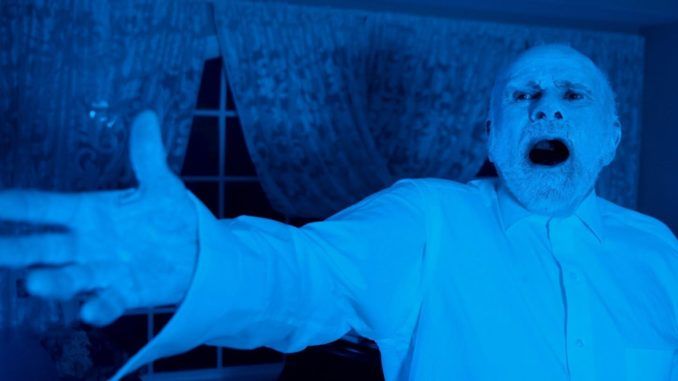
Rating: C+
Dir: Matthew Mahler
Star: Timothy J. Cox, Anthony Carey, Paula Mahler, John Mahler
Considering how far this would typically be out of my comfort zone, that grade could be considered a glowing recommendation. For my preference is strongly towards narrative cinema: the story is the frame on which everything else hangs. Mahler… does not appear to share this opinion, shall we say. Which is perfectly fine. At least, until his content crosses paths with my eyeballs, and conflict results. But art isn’t always about keeping the viewer in their happy place. That this is not always easy to watch is, I suspect, the point. It’s supposed to be unsettling, strange and off-putting. Mission accomplished, I think, making it ‘good’ art, even if it’s not for me.
This is about the disappearance of Mallory, a young woman, and the attempts of her brother, Luke (Carey) to find out what happened to her. Suspicion falls on Alan Roscoe (Cox), who is clearly up to no good, because he’s the head of the local HOA. [That’s property owner humour] His father, Alan Sr. (Mahler), recently passed away, yet still very much holds sway over his son. That there is Something Very Wrong here is apparent. Just what it might be, though… Your guess is as good as mine, and you should not expect much help from the writer-director. There’s one scene where what may (or may not) be the demonically-possessed spirit of Alan Sr. returns to advise his son (top). It’s as close as you should expect to exposition: to extend my previous metaphor, in terms of story, it’s less a frame than a picture-hook.
 However, what it lacks in coherence, is made up for in pure, industrial strength flair, with Mahler throwing the kitchen sink of filters and visual trickery at you. The title is the term for a form of colour blindness, specifically the inability to see red. There’s plenty of it here though; sometimes the same scene is shot from one direction in a red filter, the other in blue. It’s all highly destabilizing for the viewer – again, quite deliberately, I imagine. In some ways, it feels like Color Out of Space, with a Lovecraftian vibe of awful and terrible entities, influencing our behaviour, and lurking just beyond our ability to sense them.
However, what it lacks in coherence, is made up for in pure, industrial strength flair, with Mahler throwing the kitchen sink of filters and visual trickery at you. The title is the term for a form of colour blindness, specifically the inability to see red. There’s plenty of it here though; sometimes the same scene is shot from one direction in a red filter, the other in blue. It’s all highly destabilizing for the viewer – again, quite deliberately, I imagine. In some ways, it feels like Color Out of Space, with a Lovecraftian vibe of awful and terrible entities, influencing our behaviour, and lurking just beyond our ability to sense them.
I just wish it was in the service of better elements elsewhere, though the audio palette is strong. Cox is decent too, putting over the necessary sense of “wrongness”. Yet no other performances measure up, in part because they are given so little purpose in the (rough approximation of a) narrative. While Luke is nominally the protagonist, I can’t say I could tell you anything significant about him, past the “missing sister” aspect of his life. Except, when he eventually decides to go into Alan’s house, he moves at the speed of an arthritic snail on Valium, despite my frequent hurry-up gestures. It’s the kind of film I can certainly respect, and admire to a reasonable extent. As noted earlier, it’s just not for me.
